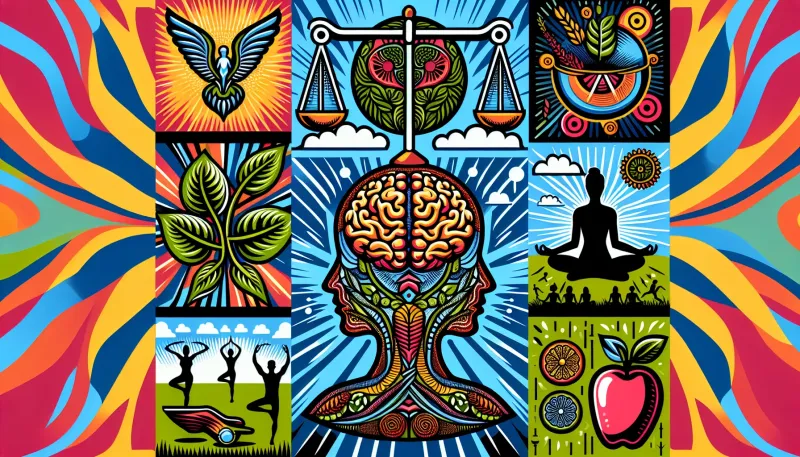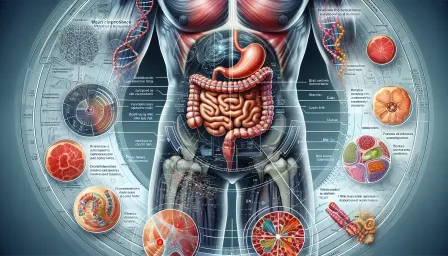Mind-Body Connection and Well-Being: Unlocking the Secrets to Holistic Health

Discover the intricate link between mind and body to unlock holistic health benefits. Learn how improving this connection can enhance your overall well-being.
The interconnection between our mind and body is a marvel of human existence. This intricate relationship plays a vital role in our overall well-being, affecting everything from our mental health to physical vitality. Understanding and harnessing this mind-body connection can lead to significant improvements in holistic health. In this article, we delve deep into the science and practical steps to enhance the mind-body connection, aiming to unlock the secrets to a healthier and more fulfilling life.
Understanding the Mind-Body Connection
The mind-body connection refers to the link between a person's thoughts, emotions, and bodily functions. This connection is not just a philosophical concept but is supported by scientific research. Various body systems, including the nervous, endocrine, and immune systems, respond to the way we think and feel. For instance, stress and anxiety can lead to physical symptoms such as headaches, muscle tension, and even cardiovascular problems.
The Role of the Nervous System
The central nervous system (CNS) plays a crucial role in mediating the mind-body connection. The brain and spinal cord interact with peripheral nerves to regulate bodily functions. Neurotransmitters and hormones released in response to thoughts and emotions can affect heart rate, digestion, and muscle function.
The Impact of Stress on Well-Being
One of the most profound examples of the mind-body connection is the impact of stress. Chronic stress can lead to a host of health issues, including hypertension, digestive problems, and weakened immune function. Stress management techniques such as mindfulness, meditation, and yoga have been shown to alleviate these negative effects, offering a pathway to better health.
Physical Symptoms of Stress
Stress manifests in various physical symptoms, including:
- Increased heart rate and blood pressure
- Muscle tension and pain
- Insomnia and fatigue
- Digestive issues like IBS
Effective Stress Management Techniques
Practicing stress management techniques can significantly enhance well-being. These include:
- Mindfulness and Meditation: These practices help in calming the mind, leading to reduced stress levels and improved mental clarity.
- Yoga: Combining physical postures, breathing exercises, and meditation, yoga enhances both physical and mental health.
- Physical Activity: Regular exercise releases endorphins, which are natural stress relievers.
Nutrition and the Mind-Body Connection
What we eat profoundly affects our mental and physical health. A balanced diet can promote a positive mind-body connection by stabilizing mood, boosting energy levels, and supporting overall bodily functions.
Foods that Enhance Mental and Physical Health
- Omega-3 Fatty Acids: Found in fish, flaxseeds, and walnuts, omega-3s support brain health and reduce inflammation.
- Antioxidant-Rich Foods: Berries, nuts, and vegetables contain antioxidants that combat oxidative stress and promote brain function.
- Probiotics: Foods like yogurt and sauerkraut can enhance gut health, which is closely linked to mood and mental well-being.
The Power of Positive Thinking
Maintaining a positive outlook can have tangible health benefits. Positive thinking has been linked to enhanced immunity, better heart health, and increased life expectancy. Cognitive-behavioral techniques and gratitude practices can foster a positive mindset, contributing to a stronger mind-body connection.
Techniques to Cultivate Positivity
- Gratitude Journaling: Writing down things you're thankful for can improve mood and emotional well-being.
- Affirmations: Repeating positive statements can shift your mindset, promoting a healthier outlook on life.
- Cognitive-Behavioral Techniques: These methods help identify and change negative thinking patterns.
Complementary and Integrative Therapies
Complementary therapies such as acupuncture, massage, and chiropractic care have been shown to improve the mind-body connection and overall well-being. These therapies work alongside traditional medical treatments to reduce pain, alleviate stress, and enhance the body's natural healing processes.
Benefits of Complementary Therapies
- Acupuncture: Stimulates specific points on the body to release tension and improve energy flow.
- Massage Therapy: Alleviates muscle tension, reduces stress, and enhances circulation.
- Chiropractic Care: Focuses on spinal alignment to improve nervous system function and overall health.
The Role of Sleep in Mind-Body Health
Quality sleep is crucial for maintaining a strong mind-body connection. Sleep allows the body to repair and recharge, and lack of restful sleep can lead to cognitive impairment, mood disturbances, and physical health problems. Establishing a consistent sleep routine and creating a restful sleep environment can enhance sleep quality and overall well-being.
Tips for Better Sleep
- Maintain a Consistent Sleep Schedule: Go to bed and wake up at the same time every day, even on weekends.
- Create a Restful Environment: Keep your bedroom cool, dark, and quiet, and invest in a comfortable mattress and pillows.
- Avoid Stimulants: Cut out caffeine and nicotine before bedtime and limit screen time to promote better sleep.
Integrating Mind-Body Practices into Daily Life
Integrating mind-body practices into daily life doesn't have to be complicated. Small, consistent changes can lead to significant health benefits. Whether it's setting aside time for meditation, eating a balanced diet, or incorporating physical activity into your routine, these practices can enhance your mind-body connection and promote holistic health.
Practical Tips for Daily Integration
- Start Your Day with Mindfulness: Dedicate a few minutes each morning to mindfulness meditation to set a positive tone for the day.
- Practice Gratitude: Reflect on three things you are grateful for each day to foster a positive mindset.
- Stay Active: Incorporate at least 30 minutes of physical activity into your daily routine to boost both mental and physical health.
Conclusion
The mind-body connection is a powerful tool for achieving holistic health. By understanding and nurturing this relationship, we can enhance our overall well-being, manage stress, and lead healthier, more fulfilling lives. Whether through mindfulness, stress management techniques, proper nutrition, or complementary therapies, integrating mind-body practices into daily life can unlock the secrets to optimal health.



























